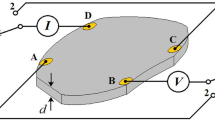Conclusions
-
1.
When the resistance of homogeneous cylindrical conductors of 6.5 mm diameter for copper and 3.3 mm for manganin are determined at a current density of 1.5 amp/mm2, the error of measurement due to temperature differences inside the conductor and at its surface can be ignored owing to their small values.
-
2.
When the resistance of cylindrical conductors with diameters greater than 6.5 cm for copper and 3.3 cm for manganin are determined, the errors due to the above-mentioned cause must be corrected according to formula (27).
-
3.
Formula (27) holds for sufficiently long homogeneous cylindrical conductors with a temperature coefficient whose sum of higher-power terms is not larger than the first term.
Similar content being viewed by others
Rights and permissions
About this article
Cite this article
Nikolaev, F.N. Effect of the internal temperature of a conductor on the accuracy of determining its electrical resistance. Meas Tech 2, 708–713 (1959). https://doi.org/10.1007/BF00995252
Issue Date:
DOI: https://doi.org/10.1007/BF00995252




